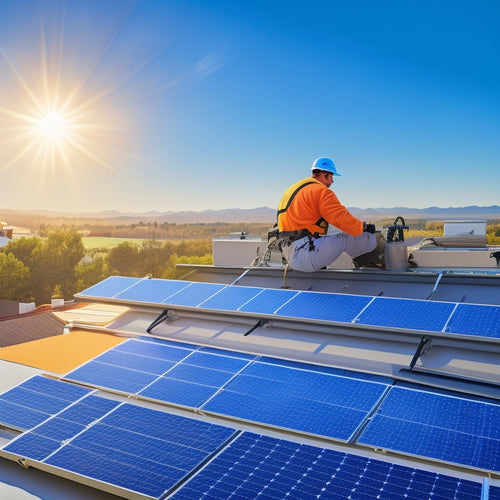
Reliable Solar Power Backup Systems for Homes
Share
You're likely considering a reliable solar power backup system for your home because you've experienced the frustration of power outages or want to reduce your reliance on the grid. A solar power backup system provides a dependable energy source, energy independence, and significant cost savings. It's crucial to understand the different types of solar panels, system configurations, and battery technologies to determine the best fit for your needs. By evaluating key components, such as system design, battery bank options, and load management, you can optimize your system's performance and energy efficiency. Now, uncover which top brands and installation tips can help you create a customized solar power backup system that suits your specific requirements.
Key Takeaways
- A reliable solar power backup system provides a consistent power source, reducing reliance on the grid and shielding from rate hikes.
- Hybrid systems combine solar energy generation with energy storage, ensuring a steady power supply during outages and peak hours.
- Lithium-ion and lead-acid batteries are crucial for energy storage, with lithium-ion offering high energy density and longevity, and lead-acid being budget-friendly.
- Proper system sizing, load management, and inverter selection are essential for optimized energy usage and efficient power conversion.
- Regular system checks, performance monitoring, and maintenance are critical for identifying trends and potential issues, ensuring continued reliability and efficiency.
Benefits of Solar Power Backup
Having a reliable power source is essential in the modern era, and solar power backup systems can provide that assurance.
You'll enjoy energy independence, reducing your reliance on the grid and shielding yourself from rate hikes. By utilizing renewable resources, you'll minimize your environmental impact, contributing to a sustainable living lifestyle.
Additionally, solar power backup systems offer significant cost savings, as you'll generate your own energy and reduce your utility bills. This investment will also increase your property value, making your home more attractive to potential buyers.
In the event of an emergency, your solar power backup system will provide a reliable source of energy, ensuring your safety and comfort. Plus, you may be eligible for government incentives, further offsetting the cost of installation.
Types of Solar Power Systems
As you consider a solar power backup system for your home, it's important to understand the different types of systems available.
You'll find that solar panel types vary, including monocrystalline, polycrystalline, and thin-film panels. Hybrid systems, which combine solar and energy storage, are also an option. If you need a temporary solution, portable solar power systems are a great choice.
When it comes to installations, you can opt for rooftop installations, which are the most common, or ground mounts, which provide more flexibility.
Battery technologies, such as lithium-ion and lead-acid batteries, play a vital role in storing excess energy. Microinverters offer several advantages, including increased energy production and real-time monitoring.
Additionally, community solar programs allow you to share the benefits of solar power with your neighbors. Each type of system has its unique benefits and drawbacks, and understanding these differences will help you make an informed decision for your home.
How Solar Backup Systems Work
With your solar power backup system installed, you're probably wondering how it actually works to keep your lights on during an outage. Fundamentally, the system converts sunlight into electrical energy during the day, which is then stored in a battery bank. This stored energy is used to power your home when the grid goes down.
The system's inverter guarantees a seamless shift between grid power and backup power, so you won't even notice the switch. During an outage, the inverter directs the stored energy from the batteries to your home's electrical panel, providing power to your essential appliances.
The system's advanced monitoring system tracks your energy usage and battery state, assuring that you have a reliable source of power when you need it most. By optimizing solar energy efficiency, your backup system can provide several hours or even days of power, depending on your energy needs and the size of your system.
This means you can stay connected, productive, and safe, even when the grid is down, thanks to the backup system reliability you can count on.
Key Components of a System
When designing a solar power backup system for your home, you'll need to take into account system design requirements that factor in your energy needs, roof size, and local building codes.
You'll also need to choose the right battery bank options, which can include lead-acid, lithium-ion, or other types, each with their own advantages and limitations.
System Design Requirements
Designing a solar power backup system for your home requires careful deliberation of several key components.
You'll need to determine the size of your system, taking into account your energy requirements and the available roof space for solar panels. A vital aspect is system efficiency, which depends on factors like the type and quality of components, wiring, and installation.
To guarantee peak performance, you'll need to balance your energy production with your energy consumption. This is where load management comes in – prioritizing essential appliances and optimizing their energy usage during power outages.
You'll also need to evaluate the type of inverter and charge controller that can efficiently convert DC power from the solar panels to AC power for your home.
Furthermore, you'll need to select a suitable mounting system for your solar panels, verifying they're securely fastened to your roof and angled for maximum energy production.
Proper system design and component selection are essential to guaranteeing your solar power backup system operates efficiently and effectively when you need it most.
Battery Bank Options
Your solar power backup system's battery bank is its energy storage hub, responsible for supplying power to your home during outages. When choosing a battery bank, you'll need to take into account factors like capacity ratings, installation considerations, and maintenance tips. Lithium batteries offer high energy density and long performance longevity, but lead acid options are more budget-friendly.
| Battery Type | Advantages | Disadvantages |
|---|---|---|
| Lithium | High energy density, long lifespan | Higher upfront cost |
| Lead Acid | Lower upfront cost, well-established technology | Lower energy density, heavier |
| Hybrid | Combines benefits of lithium and lead acid | Complex installation, limited compatibility |
You'll also need to contemplate battery management, including charging cycles and discharge rates. A well-designed battery management system guarantees your batteries are charged and discharged efficiently, prolonging their lifespan. Additionally, take into account compatibility factors, such as the type of inverter and charge controller you'll need. By carefully selecting your battery bank, you can secure a reliable and efficient solar power backup system for your home.
Top Brands for Home Use
You'll want to evaluate top brands that offer reliable and efficient solar power backup systems for your home.
Your top picks overall will likely include brands like Tesla, Generac, and Schneider Electric, which are known for their high-quality products and extensive warranties.
For best value options, you may look to brands like SimpliPhi Power and PylonTech, which offer competitive pricing without sacrificing performance.
Top Picks Overall
Among the numerous solar power backup systems available for homes, a few top brands stand out for their exceptional performance, reliability, and ease of use. As you investigate your options, consider brands that offer thorough solutions that cater to your specific energy needs.
Look for brands that provide system scalability, allowing you to easily expand or modify your setup as your energy requirements change.
Top brands like Tesla, Generac, and LG offer state-of-the-art technology that guarantees energy efficiency and minimizes environmental impact.
These brands also provide access to solar incentives, installation grants, and residential rebates, making it more affordable for you to achieve energy independence.
With their advanced systems, you can monitor and control your energy usage in real-time, optimizing your energy consumption and reducing your reliance on the grid.
Best Value Options
While top-tier brands like Tesla and Generac offer premium solar power backup systems, they may not fit every homeowner's budget. Fortunately, you can still find cost-effective solutions that provide energy efficiency without breaking the bank.
Here's a comparison of top value brands for home use:
| Brand | Price Range |
|---|---|
| SimpliPhi | $8,000 - $15,000 |
| PylonTech | $6,000 - $12,000 |
| Fortress Power | $5,000 - $10,000 |
These brands offer reliable solar power backup systems at a lower cost than premium brands, making them an attractive option for homeowners on a budget. SimpliPhi's systems, for example, provide long-lasting lithium-ion batteries and a 10-year warranty, making them a great value for the price. PylonTech's systems offer high energy density and a modular design, allowing you to scale up or down as needed. Fortress Power's systems boast advanced battery management and a 5-year warranty, providing peace of mind for homeowners. By considering these value brands, you can find a solar power backup system that fits your needs and budget.
Factors Affecting System Cost
The cost of a solar power backup system for your home is influenced by several key factors, including the type and quality of equipment, installation complexity, and local incentives.
You'll need to evaluate the upfront installation costs, which can vary depending on the complexity of the installation and the quality of the equipment. Higher-quality equipment may be more expensive, but it can also lead to greater system efficiency and longer lifespan.
You should also research local regulations and incentives, such as tax incentives, that can help offset the cost of the system.
Additionally, financing options can make the system more affordable, and you'll want to factor in ongoing maintenance expenses. Your energy needs will also play a role in determining the size and cost of the system.
Finally, keep an eye on market trends and technology advancements, as they can impact the cost and performance of solar power backup systems.
Installation and Maintenance Tips
When installing a solar power backup system, you'll need to confirm it's properly sized to meet your energy needs, which involves calculating your home's energy load and selecting the right components.
To assure peak performance, you'll also need to perform regular system checks, including monitoring battery state of charge and depth of discharge.
System Sizing Essentials
Properly sizing your solar power backup system is crucial to guarantee it meets your energy needs during an outage. You'll want to verify your system can handle the maximum load required to power your essential appliances and devices. To do this, you'll need to perform load calculations to determine the total energy needs of your home during an outage.
| Appliance/Device | Wattage | Runtime (hours) |
|---|---|---|
| Refrigerator | 150 | 12 |
| Lights (5) | 50 | 8 |
| Computer | 200 | 4 |
| Radio | 20 | 6 |
| Medical Equipment | 100 | 12 |
When performing load calculations, consider the wattage and runtime of each appliance and device you want to power during an outage. Add up the total wattage and ampere-hours required to determine the minimum capacity of your solar power backup system. Be sure to also consider any additional energy needs, such as charging batteries or powering a water pump. By accurately sizing your system, you'll have peace of mind knowing you'll have dependable power when you need it most.
Ongoing System Checks
One essential aspect of ensuring your solar power backup system remains reliable is performing regular system checks. This involves monitoring the system's performance and identifying potential issues before they become major problems.
You'll want to check the system's electrical output, battery state of charge, and overall system reliability. Performance monitoring is vital to identifying trends and anomalies that may indicate a problem.
You should also inspect the system's components, such as the solar panels, batteries, and inverters, for signs of wear and tear or damage. Check for loose connections, corrosion, or other issues that could affect system performance.
Regular system checks will help you catch minor issues before they escalate, ensuring your solar power backup system remains reliable and efficient.
Energy Storage Options Available
Investigate the various energy storage options available for your solar power backup system, and you'll find that each type of battery technology offers unique benefits and drawbacks.
You'll need to take into account factors such as capacity, depth of discharge, and lifespan when selecting the right energy storage solution for your home.
Lead-acid batteries, for instance, are a cost-effective option but have a lower energy density and shorter lifespan compared to lithium-ion batteries.
Lithium-ion batteries, on the other hand, offer higher energy efficiency and a longer lifespan but come at a higher upfront cost.
Other solar battery technologies, like flow batteries and sodium-ion batteries, offer alternative energy efficiency solutions that may better suit your specific needs.
When evaluating energy storage options, take into account your power requirements, budget, and the overall performance of your solar power backup system.
Grid Tie Vs off Grid Systems
As you weigh your options for a solar power backup system, you're likely pondering whether to opt for a grid-tie or off-grid system, each of which serves a distinct purpose and offers unique advantages.
3 Key Differences to Contemplate:
-
Grid Connection: Grid-tie systems connect to the grid, allowing you to sell excess energy back to the utility company, whereas off-grid systems operate independently.
-
Energy Storage: Off-grid systems require more energy storage capacity to guarantee a reliable power supply during periods of low sunlight or nighttime.
-
System Complexity: Grid-tie systems are generally simpler and more cost-effective, while off-grid systems require more complex installations and additional components.
Grid-tie systems offer advantages such as lower upfront costs, simpler installations, and the ability to sell excess energy back to the grid.
However, off-grid systems provide the benefit of complete energy independence, which can be vital for remote locations or areas with frequent grid outages.
Off-grid systems also come with unique challenges, such as managing energy storage and guaranteeing a reliable power supply.
Is Solar Backup Right for You
Your decision between a grid-tie and off-grid solar power backup system hinges on your specific energy needs and circumstances.
If you're looking for solar energy independence and want to reduce your reliance on the grid, an off-grid system might be the better choice. On the other hand, if you still want to benefit from the grid's reliability and only need backup power during outages, a grid-tie system could be the way to go.
Consider your emergency preparedness goals. Do you need power during extended grid outages or natural disasters? If so, an off-grid system with a battery bank can provide you with the energy independence you require.
Alternatively, if you just want to guarantee your critical appliances stay on during shorter outages, a grid-tie system with a smaller battery bank might suffice.
Assess your energy usage patterns and prioritize your needs. If you have critical loads like refrigeration or medical equipment, you'll want a system that can handle those loads during an outage.
Frequently Asked Questions
Can I Use My Existing Solar Panels With a Backup System?
With 72% of homeowners investing in solar, you're likely wondering if your existing panels can integrate with a backup system. Fortunately, most modern solar panels are compatible with backup systems, ensuring efficient energy storage and seamless changes during outages.
Do Solar Backup Systems Require Regular Battery Replacement?
You'll need to replace your solar backup system's batteries periodically, as their lifespan averages 5-15 years, depending on usage and maintenance; following tips like monitoring temperature, avoiding deep discharges, and performing regular checks can extend their life.
Are Solar Backup Systems Compatible With All Electrical Panels?
You're probably thinking solar backup systems are a breeze to install, but hold up - they're not compatible with just any electrical panel. You'll need to verify your panel meets specific requirements, like a compatible voltage and amp rating, for seamless solar panel compatibility.
Can I Expand My Solar Backup System in the Future?
You can easily expand your solar backup system in the future, thanks to modular designs that allow for seamless integration of new components, ensuring system compatibility and future-proofing your investment for years to come.
Will a Solar Backup System Work During a Power Outage at Night?
During a power outage at night, you'll be glad to know that your solar backup system will still provide power, thanks to its nighttime functionality, allowing you to stay connected and comfortable until the grid comes back online.
Related Posts
-

Top 10 DIY Conversion Kit Reviews and Tips
You're taking the first step towards electrifying your ride, and with the right DIY conversion kit, you'll be cruisin...
-

Why Invest in Residential Solar Panel Systems?
By investing in a residential solar panel system, you'll harness renewable energy, reducing your carbon footprint and...
-

3 Essential Steps for Solar Electricity Installation
To guarantee a successful solar electricity installation, you'll need to follow three essential steps. First, assess ...


